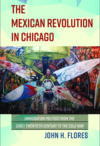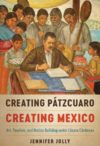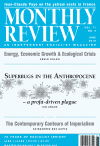Commentary

In this reprint of “On the Coincidence of Logic with Dialectics and the Theory of Knowledge of Materialism,” Evald Ilyenkov discusses the idea of the coincidence of dialectics, logics, and theory of knowledge—one of the hallmarks of the Ilyenkovian current in post-Stalin Soviet philosophy. Ilyenkov was a renowned and controversial Soviet Marxist philosopher who contributed substantially to the Marx Renaissance that emerged in the so-called Thaw Period, aiming to reconstruct Marx’s original methodology. He was known as an ardent critic of technocratic tendencies in the Soviet Union and stressed that socialist society should express humanist values and not merely be an engineering project. | more…

In The Mexican Revolution in Chicago: Immigration Politics from the Early Twentieth Century to the Cold War, John H. Flores illustrates the growth of the Mexican population in 1920s Chicago and how migrant communities situated and organized themselves politically in an often-hostile social environment. Drawing from political experiences in Mexico, Flores identifies and explores the evolution of a Mexican population whose identities and loyalties were shaped and divided by the Mexican revolutionary and counterrevolutionary processes in la patria (the homeland). | more…

As part of a deconstruction of national identity, Jennifer Jolly, in her Creating Pátzcuaro, Creating Mexico: Art, Tourism, and Nation Building under Lázaro Cárdenas, analyzes the tourist town of Pátzcuaro in the west-central Mexican state of Michoacán as a microcosm of cultural power in which tourism, art, history, and ethnicity were woven together under the presidency of Lázaro Cárdenas del Río (1934–40). | more…

Victor Grossman’s A Socialist Defector: From Harvard to Karl-Marx-Allee is at once an exciting adventure story, an engaging autobiography of a radical opponent of U.S. imperialism, and a clear-headed assessment of the successes and failures of the German Democratic Republic (GDR, East Germany) at the onset of the Cold War until 1990, when its citizens voted to merge with the Federal Republic of Germany (FRG, West Germany). Most poignantly, Grossman compares the benefits workers gained in the GDR, the FRG, and even the United States during the Cold War. | more…

The situation in Venezuela has become extremely dire due to Washington’s heightened economic warfare, its continuing attempts to engineer a political coup, and its growing threats of massive military intervention—all aimed at bringing down the Bolivarian Republic. The recent seizure of Venezuelan oil assets in the United States and its gold reserves in British banks, as well as the sanctioning of Venezuelan oil sales, have come on top of a long series of economic sanctions—beginning with the Obama administration and now intensified under Trump’s—that constitute nothing less than a modern form of siege warfare, extended to food supplies and medicine. But the Venezuelan Revolution has managed to resist in the face of the economic and political warfare of the most powerful imperialist nation in the world, and the reasons why are to be found in the nature of the Bolivarian Revolution and the Venezuelan people themselves. | more…




